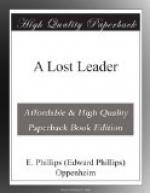“And she will you?”
“I hope so!”
She leaned back in her chair. He could not altogether understand her silence. Surely she could have no scruples?
“It seems to me,” she said at last, “that I am to play your game for nothing. I don’t care so very much, after all, if he marries. He’d settle all he could on me. In fact, I should have just as much claim on him as I have now.”
“I did not say that you should play it for nothing,” he answered. “I want us to understand each other, because I have an idea that you may be seeing something of the Duchess at any moment. Let us put it this way. Suppose I promise to give you a diamond necklace of the value of, say five thousand pounds, the day I marry the Duchess!”
She rose and put pen and paper before him. He shook his head.
“I can’t put an arrangement of that sort on paper,” he protested. “You must rely upon my word of honour.”
She held out the pen to him.
“On paper, or the whole thing is off absolutely,” she declared.
“You won’t trust me?”
She looked at him.
“There isn’t much honour about an arrangement of this sort, is there?” she said. “It has to be on paper, or not at all.”
A carriage stopped outside. They heard the bell.
“That,” she remarked, “may be the Duchess of Lenchester.”
He caught up the pen and wrote a few hurried lines. The smile with which he handed it to her was not altogether successful.
“After all, you know,” he said, “there should be honour amongst thieves.”
“No doubt there is,” she answered. “Only thieves are a cut above us, aren’t they?”
“I don’t believe,” Borrowdean said to himself, as he reached the pavement, “that that woman is such a fool as she seems.”
CHAPTER II
“Cherchez la femme”
Mannering hated dinner parties, but this one had been a necessity. Nevertheless, if he had known who his companion for the evening was fated to be he would most certainly have stayed away. Her first question showed him that she had no intention of ignoring memories which to him were charged with the most subtle pain.
He looked down the table, and back again into her face.
“You are quite right,” he said. “This is different. We cannot compare. We can judge only by effect—the effect upon ourselves.”
“Can you be analytical and yet remain within the orbit of my understanding?” she asked, with a faint smile. “If so, I should like to know exactly how you feel about it all.”
He passed a course with a somewhat weary gesture of refusal, and leaned back in his chair.
“You are comprehensive—as usual,” he remarked. “Just then I was wondering whether the perfume of these banks of hot-house flowers—I don’t know what they are—was as sweet as the odour of the salt from the creeks, or my roses when the night wind touched them.”




